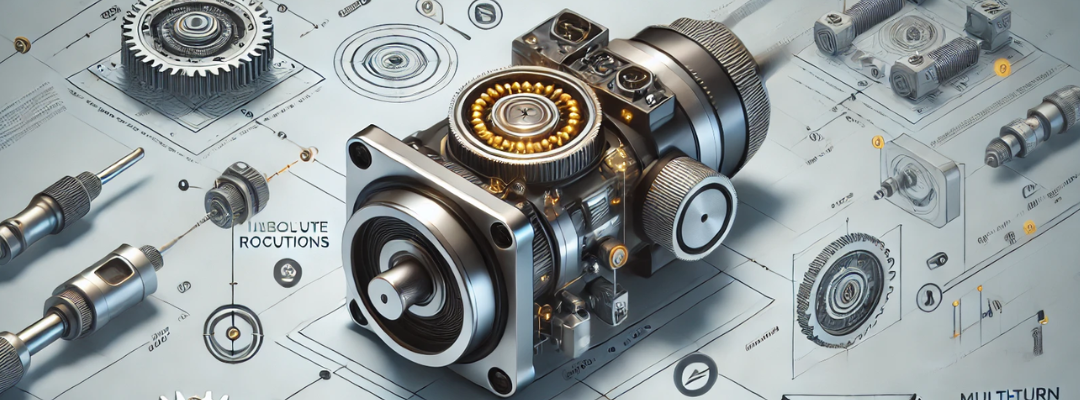A multiturn absolute encoder is a type of position sensor that provides precise and continuous position information over multiple revolutions of the encoder shaft. Unlike single-turn absolute encoders, which only measure the position within one rotation, multiturn encoders can track the position across several rotations, remembering the exact position even if the system loses power.
Function of a Multiturn Absolute Encoder
- Tracks Position Over Multiple Rotations: A multiturn absolute encoder provides a unique digital position value for every possible shaft position, not just within one rotation, but across multiple full rotations. This is achieved using a combination of fine (within one turn) and coarse (across multiple turns) position tracking mechanisms.
- Retains Position After Power Loss: One of the key features of an absolute encoder is that it remembers its position even after power is turned off. This is done using internal mechanical or electrical counting mechanisms. When the system is powered back on, the encoder provides the exact position immediately, avoiding the need for re-homing or recalibration.
- Provides Precise Feedback: The encoder provides high-resolution feedback, making it ideal for applications that require precise control of movement, such as in CNC machines, robotic arms, or conveyor systems.
- Combines Position and Speed Measurement: In addition to position, multiturn absolute encoders can also track the speed of rotation by monitoring the change in position over time, making them useful for both positional and velocity feedback in motion control systems.
Importance of a Multiturn Absolute Encoder
- Accurate Position Feedback Across Multiple Rotations: In applications where a system needs to keep track of position over long distances or multiple rotations, multiturn encoders provide highly accurate and reliable feedback. For example, in large industrial machinery or robotics, where the movement spans several rotations, multiturn encoders ensure accurate tracking of the entire range of motion.
- No Need for Homing or Re-calibration: Since a multiturn absolute encoder remembers its position even when powered down, systems using these encoders don’t need to perform homing procedures to find their reference position when restarted. This reduces downtime and improves operational efficiency.
- Ideal for Complex Motion Control: In applications such as robotics, CNC machines, and automated machinery, where motion must be controlled over multiple rotations, multiturn encoders are essential for maintaining precise control, especially when the system undergoes frequent power cycling.
- Improves System Reliability and Safety: In safety-critical systems (e.g., medical devices, elevators, and automotive steering systems), multiturn absolute encoders ensure reliable position feedback even during power failures, helping prevent positioning errors that could lead to malfunctions or accidents.
- Essential for High-Precision Applications: Applications that require high precision, such as semiconductor manufacturing equipment, robotic arms, or telescope positioning systems, benefit from the high-resolution feedback provided by multiturn absolute encoders, ensuring precise movements across a wide range.
- Wide Range of Applications: Multiturn absolute encoders are used in various industries, including:
- Robotics: For tracking complex, multi-axis movements.
- Industrial Automation: In conveyor systems, elevators, and large machinery that require position tracking over long distances.
- CNC Machines: For maintaining the position of tools across multiple rotations, essential for accurate machining.
- Wind Turbines: For monitoring the position of blades over multiple rotations.
- Medical Equipment: To provide accurate positioning in devices such as MRI machines or surgical robots.


Recent Comments